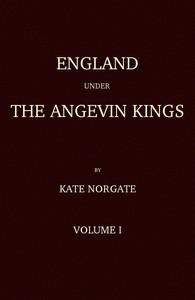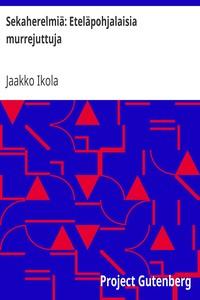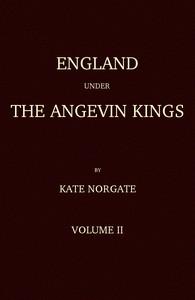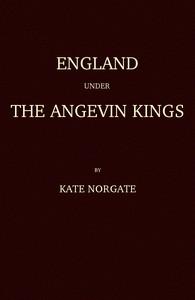|
|
Read this ebook for free! No credit card needed, absolutely nothing to pay.Words: 228442 in 66 pages
This is an ebook sharing website. You can read the uploaded ebooks for free here. No credit cards needed, nothing to pay. If you want to own a digital copy of the ebook, or want to read offline with your favorite ebook-reader, then you can choose to buy and download the ebook.

: England under the Angevin Kings Volume I by Norgate Kate - England Civilization 1066-1485; Great Britain History Angevin period 1154-1216; Anjou House of@FreeBooksThu 08 Jun, 2023 of the older asceticism he had caught too its poetic tenderness. As he wandered through forest after forest from Carlisle to the Tees he had found like S. Guthlac of old that "he who denies himself the converse of men wins the converse of birds and beasts and the company of angels." Noxious reptiles lay passive beneath his feet as he walked along and crawled harmlessly about him as he lay on the bare ground at night; "the hissing of a viper scared him no more than the crowing of a cock." The woods of Finchale were thronged with wild beasts of every kind; on his first arrival he was confronted by a wolf of such enormous size that he took it for a fiend in wolf's shape, and the impression was confirmed when at the sign of the Cross the animal lay down for a moment at his feet and then slunk quietly away. The toads and vipers which swarmed along the river-side played harmlessly about the floor of his hut, and basked in the glow of his fire or nestled between his feet, till finding that they disturbed his devotions he gently bade them depart, and was at once obeyed. A stag browsing upon the young shoots of the trees in his little orchard suffered him to put a halter about its neck and lead it away into the forest. In the long hard frosts of the northern winter he would roam about seeking for frozen or starving animals, carry them home in his arms and restore them to warmth and animation at his fire. Bird and beast sought shelter from the huntsman in the hermit's cell; one stag which he had hidden from the followers of Bishop Ralf came back day after day to be petted and caressed. Amid the silence of the valley, broken only by the rustling of the wind through the trees, the ripple of the stream over its rocky bed, and the chirping of the birds who had probably given their name to the "Finches-haugh," strains of angel-harps and angel-voices sounded in the hermit's ears; and the Virgin-Mother came down to teach him how to sing to her in his own English tongue. As the years went on Godric ceased to shrink from his fellow-men; his mother, his sister, came to dwell near him in religious retirement; a little nephew was admitted to tend his cow. Some of the younger monks of Durham, among them the one to whom we owe the record of Godric's life, were the devoted attendants of his extreme age; while from the most distant quarters men of all ranks flocked to seek counsel and guidance in every variety of circumstances, temporal and spiritual, from one whom not only all Durham but almost all England looked upon as a saint and a prophet. In strictness, we must except the years 1043-1066, when the Abingdon Chronicle is also contemporary. Precious as it is to us, however, this English chronicle-work at Peterborough was a mere survival. Half its pathetic interest indeed springs from the fact that it stands utterly alone; save in that one abbey in the Fens, English had ceased to be a written tongue; the vernacular literature of England was dead. If the reviving national sentiment was to find a literary expression which could exercise any lasting and widespread influence, the vehicle must be not English but Latin. This was the work now taken up by the historical school of Worcester. Early in the twelfth century a Worcester monk named Florence made a Latin version of the Chronicle. Unhappily, he infused into his work a violent party spirit, and overlaid the plain brief statements of the annals with a mass of interpolations, additions and alterations, whose source it is impossible to trace, and which, adopted only too readily by later writers, have gone far to bring our early history into what until a very recent time seemed well-nigh hopeless confusion. But the very extent of his influence proves how true was the instinct which led him--patriot of the most narrow, insular, exaggerated type, as the whole tone of his work shows him to have been--to clothe the ancient vernacular annals in a Latin dress, in the hope of increasing their popularity. If English history has in one way suffered severely at his hands, it owes him a debt of gratitude nevertheless upon another ground. While the last English chronicle lay isolated and buried in the scriptorium at Peterborough, it was through the Latin version of Florence that the national and literary tradition of the school of Worcester made its way throughout the length and breadth of the land, and inspired a new generation of English historians. Simeon of Durham, copying out and piecing together the old Northumbrian annals which had gone on growing ever since Baeda's death, no sooner met with the chronicle of Florence than he made it the foundation of his own work for the whole space of time between AElfred's birth in 848 and Florence's own death in 1118; and from Simeon it was handed down, through the work of another local historian, to be incorporated in the great compilation of Roger of Howden. Henry of Huntingdon, who soon after 1125, at the instigation of Bishop Alexander of Lincoln, began to collect materials for a history of the English, may have learnt from the same source his method of dealing with the English Chronicle, though he seems, naturally enough, to have chiefly used the copy which lay nearest to his own hand at Peterborough. Meanwhile, at the opposite end of England, a finer and subtler intellect than that of either Florence or Simeon or Henry had caught the historical impulse in an old West-Saxon monastery. On Simeon, see Bishop Stubbs's preface to Roger of Howden, vol. i. ; Mr. Arnold's prefaces to Simeon, vol. i., and Henry of Huntingdon ; and Mr. Hodgson Hinde's preface to Simeon . William of Malmesbury was born some three or four years before the Conqueror's death, in or near the little town in Wiltshire from which his surname was derived. One of his parents seems to have been Norman, the other English. They early destined their son to a literary career; "My father," he says, "impressed upon me that if I turned aside to other pursuits, I should but waste my life and imperil my good name. So, remembering the recommendation to make a virtue of necessity, I persuaded myself, young as I was, to acquire a willing taste for that to which I could not in honour show myself disinclined." It is plain that submission to the father's wishes cost no great effort to the boy. As he tells us himself, "Reading was the pleasure whose charms won me in my boyhood and grew with my growing years." His lot was cast in a pleasant place for one of such a disposition. Fallen though it was from its ancient greatness, some remnants of its earlier culture still hung about Malmesbury abbey. The place owed its rise to an Irish recluse, Maidulf, who, in the seventh century sought retirement from the world in the forest which at that time covered all the northern part of Wiltshire. Maidulf, however, was a scholar as well as a saint; and in those days, when Ireland was the light of the whole western world, no forest, were it never so gloomy and impenetrable, could long hide an Irish scholar from the eagerness of the disciples who flocked to profit by his teaching. The hermitage grew into a school, and the school into a religious community. Its second abbot, Ealdhelm, is one of the most brilliant figures in the history of early West-Saxon learning and culture. The architecture of Wessex owed its birth to the churches which he reared along the edge of the forest-tract of Dorset and Wiltshire, from the seat of his later bishopric at Sherborne to his early home at Malmesbury; its Latin literature was moulded by the learning which he brought back from Archbishop Theodore's school at Canterbury; and the whole ballad literature of southern England sprang from his English songs. The West-Saxon kings, from Ine to Eadgar, showered their benefactions upon the house of one whom they were proud to call their kinsman. It escaped as by a miracle from the destruction of the Danish wars; and in the Confessor's reign its wealth and fame were great enough to tempt the diocesan bishop, Herman of Ramsbury, into a project for making it the seat of his bishopric. Darker times began with the coming of the first Norman abbot, Turold, whose stern and warlike character, more befitting a soldier than a monk, soon induced the king to transfer him to Peterborough, as a check upon the English outlaws and their Danish allies in the camp of refuge at Ely. His successor at Malmesbury, Warin, alienated for his own profit the lands and the treasures which earlier benefactors had lavished upon the abbey, and showed his contempt for the old English abbots by turning the bones of every one of them, except Ealdhelm, out of their resting-places on either side the high altar, and thrusting them into a corner of one of the lesser churches of the town, with the mocking comment: "Whosoever is mightiest among them may help the rest!" William's boyhood, however, fell in happier days. About the time of his birth Warin died, and the next abbot, Godfrey, set himself to a vigorous work of material, moral and intellectual reform which must have been in full career when William entered the abbey-school. The bent of the lad's mind showed itself in the subjects which he chose for special study out of the general course taught in the school. "Logic, which serves to give point to our discourse, I tasted only with my ears; to physic, which cures the diseases of our bodies, I paid somewhat closer heed. But I searched deeply into the various branches of moral philosophy, whose dignity I hold in reverence, because it is self-evident to those who study it, and disposes our minds to virtuous living;--and especially into history, which, preserving in a pleasing record the manners of times gone by, by example excites its readers to follow that which is good and shun that which is evil." Young as he was, his studious habits gained him the confidence of the abbot. Godfrey's darling scheme was the formation of a library; and when at length he found time and means to attempt its execution, it was William who became his most energetic assistant. "Methinks I have a right to speak of this work," he tells us with pardonable pride, "for herein I came behind none of my elders, nay, if it be not boastful to say so, I far outstripped them all. I rivalled the good abbot's own diligence in collecting that pile of books; I did my utmost to help in his praiseworthy undertaking. May those who now enter into our labours duly cherish their fruits!" It is not difficult to guess in what department of the library William took the deepest interest. Half Norman as he was by descent, the chosen literary assistant of a Norman abbot, it was natural that his first endeavour should be to "collect, at his own expense, some histories of foreign nations." As he pondered over them in the quiet cloisters of the old English monastery which by this time had become his home, the question arose--could nothing be found among our own people worthy of the remembrance of posterity? He had but to look around him, and the question answered itself. To the antiquary and the scholar Malmesbury was already classic ground, where every step brought him face to face with some memory of the glories of Wessex under the old royal house from which Ealdhelm sprang. To Ealdhelm's own fame indeed even the prejudices of Abbot Warin had been forced to yield, and a new translation of the saint's relics in 1078 had been followed by a fresh outburst of popular devotion and a fresh influx of pilgrims to his shrine. Every year his festival brought together a crowd of devotees, of sick folk seeking the aid of his miraculous powers, and--as generally happened in such cases--of low jesters seeking only to make their profit out of the amusement which they afforded to the gaping multitude. The punishment of one of these, who was smitten with frenzy and only cured after three days' intercession on the part of the monks, during which he lay chained before the shrine, was one of the most vivid recollections of William's childhood. In the vestiary of the abbey-church he beheld with wonder and awe the chasuble which, as a quaint legend told, the saint in his pious abstraction of mind had once hung upon a sunbeam, and whose unusual length helped to furnish a mental picture of his tall stately form. Among the older literary treasures which served as a nucleus for the new library, he gazed with scarcely less reverence on a Bible which Ealdhelm had bought of some foreign merchants at Dover when he visited Kent for his consecration. The muniment-chest was full of charters granted by famous kings of old, Ceadwalla and Ine, AElfred and Eadward, AEthelstan and Eadgar. In the church itself a golden crucifix, a fragment of the wood of the Cross, and several reliquaries containing the bones of early Gaulish saints were shown as AEthelstan's gifts, and the king himself lay buried beneath the tower. On the left of the high altar, facing S. Ealdhelm's shrine, stood a tomb which in William's day was believed to cover the remains of a scholar of wider though less happy fame than Ealdhelm himself--John Scotus, who, flying from his persecutors in Gaul, was said to have established a school under AElfred's protection at Malmesbury, and to have been there pricked to death by his pupils with their styles in the little church of S. Laurence. The scanty traces of a vineyard on the hill-side which sheltered the abbey to the north were associated with a visitor from a yet more distant land. In the time of the Danish kings there came seeking for admission at Malmesbury a stranger of whom the brotherhood knew no more than that he was a Greek and a monk, and that his name was Constantine. His gentle disposition, abstemious habits, and quiet retiring ways won him general esteem and love; his whole time was spent in prayer and in the cultivation of the vineyard which he planted with his own hands for the benefit of the community; and only when at the point of death he arrayed himself in a pallium drawn from the scrip which he always carried at his side, was it revealed to the astonished Englishmen that he had been an archbishop in his Eastern home. "In historicis nos narrationibus occupatos detorsit a proposito tua, Rodberte, voluntas. Nuper enim cum in bibliothec? nostr? sederemus, et quisque pro suo studio libros evolveret, impegisti in Amalarium de Ecclesiasticis Officiis. Cujus cum materiam ex prim? statim tituli fronte cognosceris, amplexus es occasionem qu? rudimenta novae professionis animares. Sed quia confestim animi tui alacritatem turbavit testimoniorum perplexitas et sermonum asperitas, rogasti ut eum abbreviarem. Ego autem ... munus injunctum non aspernanter accepi." ... Mr. Birch takes this Robert to be the earl. But does not the phrase about "nova professio" rather suggest a new-made monk of the house? What gave scope for all this social, moral and intellectual developement was, to borrow a phrase from the Peterborough Chronicler, "the good peace" that Henry, like his father, "made in this land." The foundations of the political and administrative system by which that peace was preserved inviolate to the end of his reign were laid in the three years succeeding the battle of Tinchebray--the brightest period of Henry's prosperity, and the only time in his life when he himself could enjoy, on both sides of the sea, the tranquillity which he fought to secure. In England, indeed, from the day when he drove out Robert of Bell?me in 1103 to his own death in 1135, the peace was never broken save by an occasional disturbance on the Welsh border. Even in Wales, however, the settlement of the Flemings and the appointment of a "Saxon" bishop to the see of St. David's were doing their work; and though in Henry's later years the restlessness of the Welsh princes and people twice provoked him to march into their country, the danger from them was never great enough to mar the general security of the realm. From Scotland there was still less to fear; its three successive kings, Eadgar, Alexander and David, were the brothers of the good queen Maude and the faithful allies of her husband. But in Henry's dominions beyond the sea, the state of things was very different. In the duchy of Normandy the year 1110 saw the opening of a new phase of politics, the beginning of a train of complications in which England seemed at the moment less directly concerned than in the earlier struggles between the king and the barons, but which in the end exercised an important influence on the course of her after history by bringing her into contact with the power of Anjou. Before we can trace the steps whereby this came to pass, we must change our line of thought and study. We must turn aside from the well-worn track of English history to travel awhile in less familiar paths; we must leave our own land and make our way into the depths of Gaul; we must go back from the broad daylight of the twelfth century into the dim dawn of the ninth, there to seek out the beginnings and thence to follow the romantic story of the house of Anjou. Eng. Chron. a. 1087. Flor. Worc. , vol. ii. p. 68. THE BEGINNINGS OF ANJOU. The cradle-land of our Angevin kings, the original county of Anjou, was a small territory in central Gaul, lying about the lower course of the river Loire and that of its affluent the Mayenne or Maine. Its chief portion consisted of a wedge-shaped tract hemmed in between the right bank of the Loire, which bounded it on the south, and the streams of Loir, Sarthe and Mayenne, which flowed round it on the north and west; along its southern border stretched a belt of alluvial soil which in winter and in rainy seasons became a vast flood-drowned fen, swallowed up by the overflowing waters of the Loire; to the northward, the country consisted chiefly of level uplands broken here and there by patches of forest and tiny river-valleys, and rising in the west into a range of low hills, which again died down into a fringe of swampy meadow-land along the eastern bank of the Mayenne. A narrow strip of ground on the southern bank of the Loire, with a somewhat wider strip of hilly and wooded country beyond the Mayenne, completed the district to which its earliest known inhabitants, a Gallic tribe called Andes or Andegavi, have left their name. A few miles above the angle formed by the confluence of the two rivers, a lofty mass of black slate rock thrown out from the upland furnished a ready-made fortress important alike by its natural strength and by its geographical position, commanding the main lines of communication with central, northern and southern Gaul through the valleys of the Loire and its tributaries. Under the Roman conquerors of Gaul the place was called Juliomagus; the hill was crowned by a lofty citadel, and strengthened by a circuit of rampart walls; while from its crest a road struck eastward along Loire-side into the heart of central Gaul, another followed the westward course of the river to its junction with the sea, and others struck southward and northward into Aquitania and across the upland into the basin of the Seine. In the middle of the fourth century a Christian bishop, probably one of a band of mission-preachers who shared with the famous S. Martin of Tours the work of evangelizing central Gaul, laid beside the citadel of Juliomagus the foundations of a church, which in after-time grew into the cathedral of S. Maurice; and it is from the extent of the diocese over which his successors ruled that we learn the extent of the civil jurisdiction of Juliomagus. A later bishop, Albinus, left his name to the great abbey of S. Aubin, founded in Merovingian days on the slope of the hill just outside the city wall; a monastery dedicated to S. Sergius grew up to the north, in a low-lying marshy meadow by the river-side; while the place of the Roman prefects was taken by a succession of Frankish counts, the delegates first of the Merovingian kings of Neustria and then of the Karolingian emperors; and the Roman name of Juliomagus itself gave way to a native appellation cognate with that of the district of which it was the head--"Andegavis," Angers. Free books android app tbrJar TBR JAR Read Free books online gutenberg More posts by @FreeBooks
: Sekaherelmiä: Eteläpohjalaisia murrejuttuja by Ikola Jaakko - Short stories Finnish; Finnish fiction 20th century; Dialect literature Finnish@FreeBooksThu 08 Jun, 2023
|
Terms of Use Stock Market News! © gutenberg.org.in2025 All Rights reserved.






